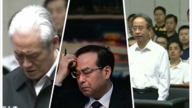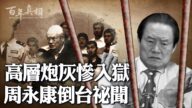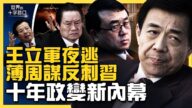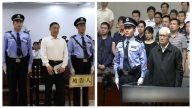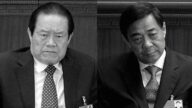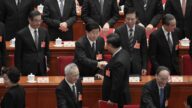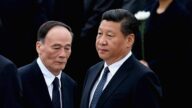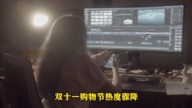【新唐人2014年09月04日讯】据大陆媒体最新消息,中共前政法委书记周永康的涉案金额尚在核定当中,但公审需要的材料已开始准备。有消息透露,与周永康案有关系的中石油系和中石化系中,很多中层官员早在中纪委收网前,已寻找机会,携带数额巨大的资金移民,外逃到了加拿大等地。
广东媒体《时代周报》9月1号发自北京的消息说,7月29号周永康被立案审查的消息公布后,与周相关的一个庞大的利益集团也浮出水面,在日益增员的“打虎”名单里,仅中石油系统的就多达十几人。
目前揭露出的贪腐案件,有超过1/3和煤炭、石油等能源产业相关。《时代周报》记者通过统计发现,能源系的贪官涉案总金额可能高达数千亿元,甚至更多。其中,仅与中石油一家相关的贪腐涉案金额,就高达1020多亿元。这一数字,接近于113家央企,在去年1.3万亿元利润总额的10%。
报导特别指出,中石油去年的年度财务报告显示,去年全年,中石油实现净利润约1422亿元。而这些利润的实现,都建立在93号汽油,从2008年的5.44元/升,涨到前年的8.33元/升,又到去年12月的7.81元/升的高涨弱跌波动上。
时事评论员邢天行:“它们油价在不断的涨,每年报亏损还那么多,还让国家财政补贴那么多。这就是以前的乱象到最后的一个总爆发。他只要在这个利益的枢纽当中,他就是成帮结伙的,他们也是一帮一帮的在贪。中国百姓根本不可能去得到所谓的国民经济,GDP提升之后,得到一些利益。他没有得到。”
已公开的并不是全部。《时代周报》引用一位全方位接近中石油和中石化系的消息人士的话说,有很多中石油系和中石化系中层官员,早在中纪委收网前,就寻找机会移民外逃到了加拿大、美国、阿联酋等地。预计因此被转移到海外的资金额度,将在200亿到400亿元之间。
时事评论员张健:“在中央对‘石油帮’全面的整肃之后,所有的官员就会面临两个选择,一个是选择进监狱,另一个选择就是跑到海外,这样可能还有一线生机。这也是贪官的命运所决定的,他们今天走上这样一个流亡的路,而且这种路是不被任何国家和政府所喜欢的。凡是追随血债帮、追随江泽民,可能他们下一步都会面临到大量的问题。”
报导还援引中共国务院政策研究中心主任张燕生的话说,中共总书记习近平去年前往上海调研后,已明确经济体制改革举步维艰的原因,是因为政治体制的束缚。因此,习近平班子的反腐,不是“点到为止”。
邢天行:“其实,我们用中共的话语去解读,就非常明显,它实际上是一种政治路线的斗争,也就是他要清除以往的政治集团那些人。这次反腐,他(习)说了是要从上往下,他就意识到了整个腐败的根,就是在他们操控的最高当权者。他的决心就是要通过这个腐败,彻底的把原来的那一伙,在政治上有势力的这些人全部都拉下来。”
邢天行认为,这其中也给习惯辨识政治风向的中共官场一个清晰指向,前中共党魁江泽民地位已经不稳了,因为,他是目前被整治的腐败利益集团的最上线。
总部设在华盛顿的非营利机构“全球金融诚信组织”(Global Financial Integrity)曾估计,从2005年到2011年间,估计约有2兆8,300亿美元资金非法从中国流出,数额惊人。
从今年1月起,中共中央纪委书记王岐山,将国际追逃追赃提升至前所未有的高度。
7月22号的“猎狐2014”专项行动展开以来,中共警方宣称,已将18名重大经济犯罪境外逃犯缉捕回国。
不过,要追回这些外逃资金恐怕不易,因为中共不仅司法制度不透明,而且也并没有和绝大多数西方国家签署引渡条例。
采访/陈汉 编辑/王子琦 后制/陈建铭
Wang Qishan Hunts Down Runaway Corrupt CNOC Officials
Chinese media reported that the amount of cash that former
politician Zhou Yongkang has embezzled is still in approval.
The material for public trial is in preparation.
Sources reveal that mid-level officials, who were linked
to Zhou in the China National Petroleum Corporation
(CNOC) and Sinopec, took a chance transferring their assets
and immigration to Canada and other countries before
disciplinary organs ties the net.
Guangdong’s The Time Weekly newspaper cited Beijing
news that after the regime announced an investigation into
corruption charges against Zhou Yongkang on Jul. 29,
a huge interest group that were linked to Zhou also floated up.
Dozens of officials of CNOC were on the list
of “tigers to fight."
Over one-third of corruption cases were related
to energy sectors including coal and oil.
Time Weekly found, via statistics, that officials in energy
sectors likely had embezzled hundreds of billions in cash.
For example, a corruption case which was linked to CNOC
involved 102 billion yuan.
It is equivalent to 10 percent of the 1.3 trillion yuan profits
that 113 state-run companies made last year.
The report particularly points out that CNOC last year’s
account shows they’ve made 142 billion net profits last year.
Profits came from the sale of No. 93 petrol.
The petrol price has gone up from 5.44 yuan per liter
in 2008 to 8.33 yuan per liter in 2012, then dropped
to 7.81 yuan per liter last Dec.
Xing Tianxing, current affairs commentator: “Their petrol
price consistently goes up.
But they reported to the central regime that their losses were
bad, then the state assigned the company many subsidies.
The previous chaos has broken out in the end.
As long as they are in the interests structure,
they would form group by group.
So, group by group became corrupted.
It is impossible for Chinese people to get some interests
after the so-called national economy and GDP kept rising up.
Chinese civilians didn’t get."
The information hasn’t been completely disclosed.
The Time Weekly cited a person familiar with CNOC
who said Sinopec that many mid-level officials in CNOC
and Sinopec fled to Canada, the U.S., United Arab Emirates
and other places before disciplinary organs ties the net.
It is estimated that the assets that had been sent abroad
will reach 20 to 40 billion yuan.
Zhang Jian, current affairs commentator: “After the central
regime completely purge the “oil faction," many officials
will face two choices – one is prison, the other
is to flee overseas.
They think this way they can keep themselves alive.
This is decided by corrupt officials.
They chose to escape, but they are not welcome
by any country and government.
Anyone who followed the Jiang Zemin faction
will face many big problems next.
The report cited Zhang Yansheng, the director
of the State Council’s policy research center, who said that
Xi Jinping went to Shanghai last year stating reasons
of economic reform difficulty.
It is because of the politics system restriction.
Thus Xi’s administration fighting corruption
is not just on the surface.
Xing Tianxing: “It will be obvious if we use the CCP’s
culture to explain it.
It is actually a political line struggle.
He wants to clear out the former political group.
Regarding the current anti-corruption, Xi has said
to have it cleared out from top to bottom.
He has realized the roots of corruption
were from the highest level.
He determined that anti-corruption will completely
remove all former officials who still had political strength."
Xing observes that this gives a clear guide to those officials
who were familiar with the political trend.
Jiang Zemin’s status has been shaky because he is the top line.
This interest group is currently under corruption investigation.
Washington-based non-profit making organization
Global Financial Integrity estimates that from 2005 to 2011,
roughly $2.83 trillion illicitly flowed out of China.
From January this year, Wang Qishan, Secretary
of disciplinary organs investigating into corrupt Chinese
officials and assets worldwide to an unprecedented level.
Since the action launched on July 22 to trace
corrupt officials and assets,
18 main economic criminals had been extradited
home from overseas.
However, it is not easy to trace all the outflow assets.
The CCP not only has an opaque judicial system, but also
hasn’t signed the extradition treaty with Western countries.
Interview/ChenHan Edit/Wang Ziqi Post-Production/Chen Jianming


